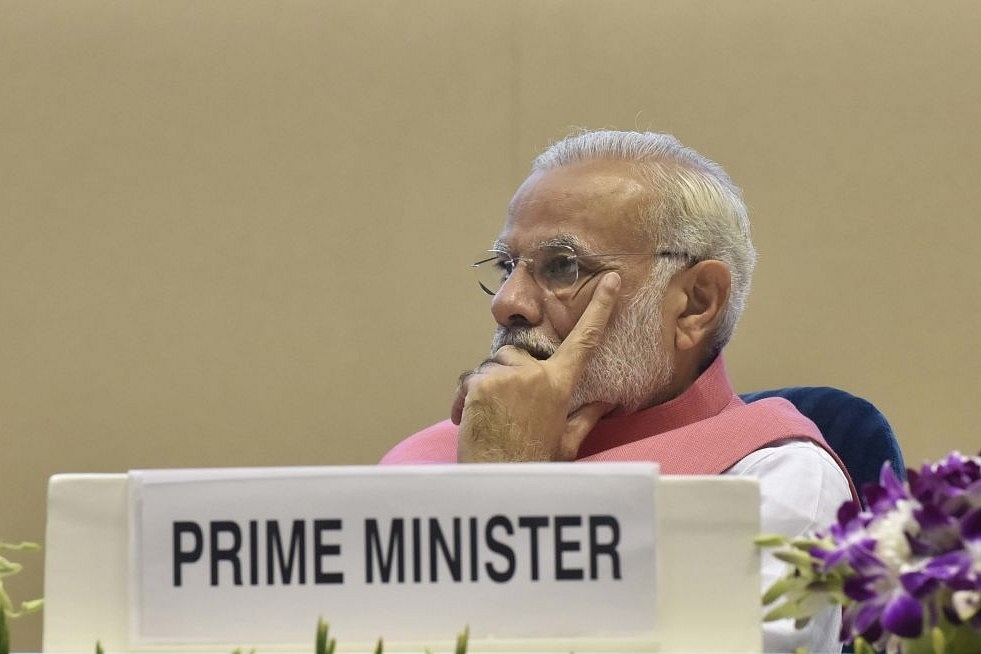Economy
PM Modi Interview 6: Can We Have Milk And Mercedes At The Same Rate, GST Critics Asked
- GST is bringing about massive change, and when a reform of this magnitude is carried out, we often see teething troubles, but these issues are addressed in real time, says the Prime Minister in an exclusive interview with Swarajya.

Prime Minister Narendra Modi during at international conference on empowering consumers at Vigyan Bhawan, New Delhi. (Sonu Mehta/Hindustan Times via Getty Images)
In this segment of the Narendra Modi interview to Swarajya, the Prime Minister talks about the goods and services tax, and how it is changing the way India does business. (Read the previous part of the interview here)
Swarajya: A year ago, you launched the GST claiming it as a good and simple tax. We believe it is certainly a good tax, but critics say it is too complex. They say that the tax should ideally have had one single rate. Your comments.
Narendra Modi: Trust Swarajya to begin with a leading economic question.
It would have been very simple to have just one slab but it would have meant we could not have food items at zero per cent tax rate. Can we have milk and Mercedes at the same rate? So, when our friends in Congress say that they will have just one GST rate, they are effectively saying they will tax food items and commodities, which are currently at zero or 5 per cent, at 18 per cent.
Swarajya: What are the benefits so far, according to you?
Modi: Let me start with some numbers.
The number of enterprises registered from Independence until now was 66 lakh. In just one year after the introduction of GST, the number of new enterprises registered is 48 lakh. Around 350 crore invoices were processed and 11 crore returns were filed. Would we be looking at such numbers, if GST were indeed very complex?
Check-posts across the country have been abolished and there are no more queues at state borders. Not only are truck drivers saving precious time but also the logistics sector is getting a boost and thereby increasing the productivity of our country. Would this be happening if GST was complex?
Swarajya: Why do we still hear so much criticism from business and economists?
Modi: GST was a massive change, requiring a complete reset of one of the world’s largest economic systems. The reform merged 17 taxes, 23 cesses into one single tax. When it was finally introduced, it was our endeavour to make it simple and ensure sensitivity of the system. There are often teething troubles seen when a reform of this magnitude is carried out, but these issues were not only identified but also addressed in real time.
Swarajya: GST is still a work in progress even after one year.
Modi: GST is an evolving system and we calibrate based on feedback from state governments, people, media, etc. A lot of feedback from the people, traders, etc, has been incorporated.
The GST has seen Indian cooperative federalism at its best. We consolidated the states and developed proactively a consensus, where earlier governments had failed.
Swarajya: Will we see rates coming down further?
Modi: Talking about rates, earlier many taxes were hidden. Now, what you see is what you pay. Government has reduced taxes on nearly 400 groups of items. Around 150 groups of items have zero per cent tax rate. If you look at the rates, for most of the day-to-day commodities, the rate has actually come down. Be it rice, wheat, sugar, spices, etc, total tax levied has been reduced in most cases. Large number of items of daily usage are either exempted or in 5 per cent slab. Some 95 per cent items fall in/below the 18 per cent slab.
Swarajya: Is GST in any way linked to your economic philosophy of minimum government?
Modi: GST has been designed to eliminate Inspector Raj with the help of information technology. From returns to refund everything happens online.
(The next part of Prime Minister Narendra Modi’s exclusive interview to Swarajya, where he answers questions on the NDA’s 2019 prospects, one-nation-one-poll, internal security and other issues will be published tomorrow).
Support Swarajya's 50 Ground Reports Project & Sponsor A Story
Every general election Swarajya does a 50 ground reports project.
Aimed only at serious readers and those who appreciate the nuances of political undercurrents, the project provides a sense of India's electoral landscape. As you know, these reports are produced after considerable investment of travel, time and effort on the ground.
This time too we've kicked off the project in style and have covered over 30 constituencies already. If you're someone who appreciates such work and have enjoyed our coverage please consider sponsoring a ground report for just Rs 2999 to Rs 19,999 - it goes a long way in helping us produce more quality reportage.
You can also back this project by becoming a subscriber for as little as Rs 999 - so do click on this links and choose a plan that suits you and back us.
Click below to contribute.
Latest